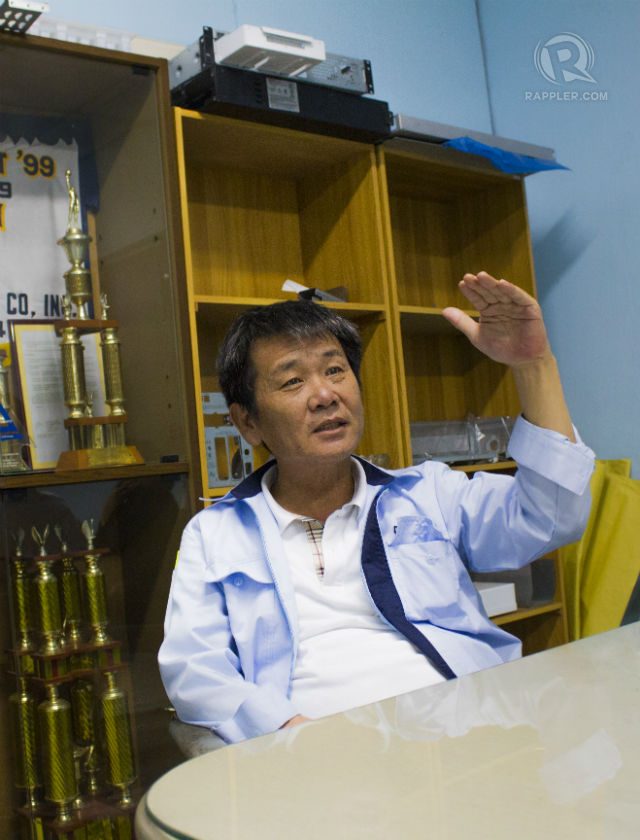SUMMARY
This is AI generated summarization, which may have errors. For context, always refer to the full article.

MANILA, Philippines – 28-year-old Anna Gianan burst into tears when she recalled how she was at the brink of losing her job in a Cavite factory.
She said she was accused of “insubordination” – of willfully refusing to follow the orders of her superior – when all there was, was mere miscommunication.
Without any previous warning or notice, she was unloaded of work but still given pay for two months over the incident – a move her lawyer would later on brand as “constructive dismissal.”
But Gianan never resigned and her non-resignation could not make the incident a constructive discharge. She could not bring herself to leave the 4 walls of metal factory Tae Sung Philippines.
While still receiving her salary, Gianan said the lack of a workload didn’t feel right. This was not who she is as a worker, citing her production output and near-clean attendance.
She would leave home early in the morning, only to sit down in the Tae Sung office with no tasks assigned to her as if to reflect her competence level.
Her prolonged idle time while the rest were hard at work made the factory “hostile” to her, she said.
“Hindi ako nagtapos para lang tumanganga nang ganoon (I did not finish my education just to sit idly),” she said, narrating how she had shifted from one course to another and how she worked every summer during her college years.
With the help of the workers’ union at Tae Sung, Gianan brought her grievance before the labor department’s regional office.
“Mali kasi eh (It was just wrong),” she said, trying hard to hold back a sob. It would have been okay if it were any valid ground, she added.
Labor union density
Gianan would not have known where to turn to or what she is legally entitled to question, were it not for the workers’ union, she said.
In the Philippines, however, labor union leaders have decried dwindling labor union density and the loss of interest among younger workers and newer industries in union membership and organizing.
Latest state figures show newly registered unions are at their lowest since 1976, with only 126 new unions registered in 2013. This, despite a reported jobs growth in the country.
There were 717 unions dissolved in 2006 alone. This is greater than the 653 unions cancelled or dissolved in 1972, when Martial Law was declared.
Alan Tanjusay of the Trade Union Congress of the Philippines (TUCP) blames waning unionism to aggressive union-busting by employers, often making members more vulnerable to job loss.
“Workers lose interest at unions because they are being discouraged and threatened by employers or companies into forming or joining labor unions,” Tanjusay said.
The benefits on paper of having legal standing to negotiate with the employer are sometimes seen by workers as less attractive when weighed against the real-world costs of openly supporting organized dissent in the workplace.
The case of Tae Sung
Workers of Tae Sung Philippines interviewed by Rappler said minor infractions in the factory previously glossed over by management were suddenly dealt with heavily after the creation of the union, with union members often getting heavier penalties than non-members.
In February, union members went on a two-day strike which ended after the management acceded to some of their demands, including wage hikes and more benefits.
Speaking with Rappler, Tae Sung management representative and human resource manager Elizabeth Abasolo regarded the factory union as a “healthy union” and the February strike as “peaceful.”
Abasolo said the management only hopes that workers, especially union members, commit to better workplace performance, citing declining labor productivity in Tae Sung.
The Tae Sung management insists it is regularly updating its pay scheme based on company profits, with an emphasis on worker performance.

But barely 3 weeks since the previous settlement, Tae Sung unionists voiced anew alleged labor violations of their employer.
Partido Manggagawa alleged that the management “has dismissed two union members and suspended 6 more” since the February strike ended, tagging such actions as “retaliatory acts.”
Important tool
Such perceived resistance from employers contribute to workers increasingly doubting and being indifferent to unionism, thus contributing to its decline.
Amid the decline in organized labor, Labor Secretary Rosalinda Baldoz said she is “committed” to maintain “an atmosphere conducive to the exercise of trade union rights, free from unreasonable restraint and infringement.”
Partido Manggagawa spokesperson Wilson Fortaleza explained that a union is a balancing mechanism given the often unequal relationship between labor and capital.
“It was through unions that the people of today enjoy core labor standards,” he said.
“Without a union, workers are left at the mercy of capital” and “denied a collective voice in redressing their grievances to influence company policies that affect their working conditions,” he added.
Tanjusay said “all workers should organize themselves into union” as a tool for “a strong and united effort to ensure that they get equal pay and equal benefits.”

Social mobility
Gianan told Rappler that people have advised her to just let go of any resentment over her suspension to pacify her supervisor whose move to punish her she had questioned.
But this she would not let go, she said.
When she read the letter calling her “uncooperative” and redistributing her workload to others as if belittling her share in the workplace, she said it was an attack on her dignity as a worker.
Tae Sung union leader Charlie Piamonte said Gianan’s case is one of the less consequential cases in the factory.
Others have been meted the penalty of dismissal for allegedly overblown offenses, he added.
Piamonte, now working with Tae Sung for 16 years, said he understands that job security is not easy to come by, given the many flexible hiring arrangements employers would rather avail of. (READ: House panel tackles job security bills)
The 52-year-old added that the factory workers who voted for him as union president and who have not finished their education would be unaware of their rights as workers if not for labor union organizers in Cavite.
The sprayers, inspectors, assemblers, machinists and line leaders of his organization wouldn’t have known they were entitled to a safe workplace, a host of law-mandated benefits, and most of all, security of tenure, which protects them from termination without just cause – conditions that ensure a chance at a better life.
If not for them, for their children at the very least. – Rappler.com
Add a comment
How does this make you feel?
There are no comments yet. Add your comment to start the conversation.